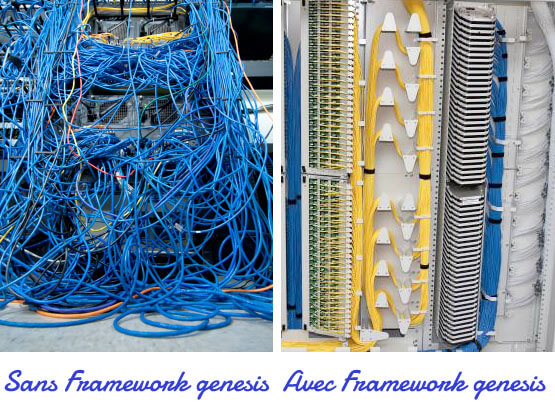Studiopress is an American web development company that plays its own card from the WordPress CMS.
Composed of high-end coders, Brian Gardner’s team offers WordPress themes that will be considered “simple and tasteful” whose particularity is that they work on a layer of code placed between WordPress and the theme itself. A kind of canvas that adds, reorganizes and manages certain functions, especially those related to SEO.
This is called a framework… or “framework” (literal translation), okay, we keep the English name.
This sketch simply positions the role of the framework :
- WP is the engine,
- Genesis is the body (carbon fiber/honeycomb – light, yet strong)
- The theme is now nothing but painting.
What is this layer of intermediate code (framework) used for?
With Genesis your theme is completely independent of the WordPress CMS, it is said to be a child theme of the framework.
The customization of your theme (the design of your site) will not be dependent on WordPress in any way.
This makes a huge difference when WordPress updates, (One per month since 2013), because you won’t run the risk of losing your CSS changes.
Concretely, with Genesis, the two files that will mainly be used to modify the features and design of your child theme will be the functions.php and style.css files.
No need to fiddle with other files, the essentials are here! The most important features are at the level of Genesis and it is very followed by StudioPress, its designer!
Genesis offers a single basic structure for all of its models,
- The structure is unique to studioPress’ choices in terms of functions
- It has an ultra-efficient and “anti-gas” coding quality
It is a unique basic structure that in my daily practice saves me a lot of time.
- the code is constant, the trend is to update html 5 css3
- The classes are constant, which simplifies the work
- this structure is proven and optimized in particular for SEO
- when the framework is updated, or WordPress (more than one per month for the past 18 months), the theme does not move.
No more crashes on update, it’s good for the customer and it’s less trouble for the developer…
More and more developers are getting into it and we are seeing themes that come out of the StudioPress mold and that we can think remain “basic, simplistic and unoriginal”.
ZigZagPress is one of those companies that offers much more original Genesis themes.
There are also independents who master it, promote it or have definitively adopted it. In Quebec, I would mention JP from TWF, but there are others.
Genesis installs in 2 clicks like a WP theme, then you have to install the compatible child theme and everything works together, easy as pie.
The strength of Genesis lies in the fact that it uses WordPress’ “Hooks” anchors, which give the ability to configure everything without ever touching the theme’s source code as is done in principle.
The interface doesn’t look like those long pages full of clickboxes or functions to drag. At the very least, you need to have the basics to work on function.php and CSS and to have taken the time to adapt to this way of thinking about the code.
All PHP specific commands are available to license holders.
The cost of a Genesis theme?
$80(US) for the unrestricted reusable framework + $25/$60 per model on average for the Child.
This is a far cry from free themes, which are most often a great risk-taking in terms of their sustainability when they are not good scams.
And at this price you have nothing less than the Rolls Royce of WordPress sites.
It still needs to be configured
Once translated (with the Genesis Translation plug-in that frees you from the usual maneuvers of translating themes via the .po file, etc.) you understand most of the options you are working on via the administrator interface and the menu:
- Theme setting that includes feeds, breadcrumbs, archive options, blog options, and fields for tracking codes (analytics or webmaster tools or micro formats for example)
- SEO tuning (so no more SEO plugins like Yoast) which includes,
- The publisher tag
- The semantic html5 option
- The tags of the home page when it uses widgets
- Header and footer options (direct code insertion)
These settings can be saved and re-imported to another site in Genesis
Moreover, on every page
-
- The possibility of placing the noindex, nofollow tags
- to modify the canonical
- to master the Title and the meta description of course
- The ability to put in nofollow, noindex, noarchive
- and an input field for specific conversion tracking codes
- The adjustments of the structure variations are available on each page with a simple click at content/sidebar/sidebar or sidebar/content/sidebar or full width 5 choices interchangeable at will
Genesis-specific extensions
The plug-ins you choose will preferably belong to the Genesis family, it’s a question of consistency, lightness of coding and tracking quality…
When you type Genesis in the search field for extensions, you see that nothing is missing.
For my part, I remain as sober as possible… I like ” simple edit ” which allows you to intervene on the footer, translation that I have already mentioned, and responsive slider in case of carousel. For the rest I opt for lightness, display speed and the minimum number of requests with the server.
The Framework is so widespread that some Woo commerce templates (another frame work) are compatible with it and Jigoshop has also coded its plugin for Genesis
To access StudioPress’ purely advertising arguments:
http://www.studiopress.com/features
Random articles
- The Genesis framework, the rolls for WordPress
- Onpage Optimization
- NDD and SEO: what levers?
- Choosing an SEO: what criteria?

